8.26.25 - Biblical Narrative and the Fall of Man
- tmaley
- Aug 28
- 13 min read
Video Arriving 08/29/2025
Opening Prayer:
Dear Lord
We know that every discouragement begins with something we don't like or can't control and then graduates to places we don't want it to be. Help us go back and give it to the You, and then walk with You.
May every moment and every task be unto the Lord.
As you taught us to pray together:
Our Father
Who art in Heaven, Hallowed be Thy Name.
Thy Kingdom come, Thy Will be done, on earth as it is in Heaven.
Give us this day our daily Bread;
And forgive us our trespasses as we forgive those who trespass against us.
And lead us not into temptation but deliver us from evil. Amen.
Upcoming major holy days: November 1: All Saints Day
Today’s Agenda
1. Reflection: Why is the Fall of Man important? Understanding the Biblical Narrative.
2. Gospel Reading for 22nd Sun in Ordinary Time, Parable on the Kingdom and Humility, Luke 14:1,7-14
3. Genesis 3, The Fall of Man
Quote of the Week:
“No man is condemned for anything he has done. He is condemned for continuing to do wrong. He is condemned for not coming in out of the dark and into the light.” – Robert MacDonald
Why is the Fall of Man important?
The Fall is essential to understanding both Christianity and human nature.
If we refuse to see that we are fallen – meaning our tendency to lie, cheat, steal, and be self-centered, angry, greedy, envious, and prideful – then we can’t be helped. Our egos prefer us to think we don’t have a self-centered problem. And if we don’t have a problem, then we don’t need to be saved.
However, anyone with an ounce of honesty knows we have a problem. God sure knows it, and offers us a way out. He wants us to be His apprentices. Each of us a unique apprentice learning to use all the gifts He gave us to accomplish great things. Rejecting this is like a youth telling the master carpenter or pianist, “I don’t need your help, I got this!”
God is the greatest therapist, and as any good therapist will tell you, recognizing one’s problems is the first step to fixing them. God gives us guidelines to measure our behavior so that we can see when our egos are in need of a leash. Then God will stay with us through therapy – throughout our entire lives – helping us to be the best we can be.

In other words, man chose to make God in his image = The Fall of Man
God is perfect love, perfect good, and perfect justice. He made us in His image, and we rejected it for our own image. God still wants us to be in his image, choosing good and refusing evil. Fortunately, the spirit He gave us moves us toward him like a homing device, through beauty and goodness, to the real thing. – George MacDonald
The Biblical Narrative

What many Christians are missing is a Biblical narrative and where we fit into it. Without this knowledge, religion fails at its primary purpose. It’s like being in a play and not knowing the story or our roles in it.
The Biblical narrative is the story of us. It is the story of Salvation history.
We often take certain words we’ve heard a million times for granted. What does the word “salvation” mean?
“Salvation” has two root connections: 1) “salve,” which is an ointment for healing, and 2) save, such as saving someone from harm or destruction. Therefore, Salvation History is the history of God trying over and over to heal and save humanity. In the end, He came to accomplish the task Himself. Although he removed all the obstacles (i.e., offering us forgiveness for-the-asking and reopening the gates of Heaven), like our first parents, we retain our freedom to choose Him or not.
What is the Biblical Narrative?
Whether we call it the Christian Narrative, Biblical Narrative, or Salvation History Narrative, they are all the same narrative. The Biblical Narrative is the story about a good/loving Creator-God who grants living beings like us spiritual natures like Himself. That is what is meant by being made in God’s image and likeness.
This spiritual nature gave us several high-level advantages, including the free will to make moral choices. God was teaching man how to use these skills when they chose themselves over God, and then things went horribly wrong. This would be (should be) a bad ending, but this loving God did not cancel or abandon us, but instead increased His participation in our lives to help us right the course. This is what the Old Testament is about – the story of Israel – where He provided constant help, instructions, and commandments, and they learned praise and worship. Yet, the Israelites continued to go astray. STILL God still did not abandon us, but responded to our continual rejection with love by entering into His own creation to help us. These events converged in the arrival of Jesus, who redeemed humanity and sent the Holy Spirit to begin remaking us and the world. This remaking of a New Creation was the point of His coming (“Behold, I make all things new” – Rev 21:5). God wants all of us to be part of this New Creation process, which will culminate right after judgment day. It’s a wonderful story.
It’s as though we are in a Shakespeare play with five acts, but people need to know they are in the play so they can choose their parts in it. That’s why spreading the Gospel is the first priority given to the Church.
What are the five acts in the Biblical Narrative?
- Act I: The Goodness of Creation
- Act II: The Fall
- Act III: Israel – valuable lessons for all nations and preparation for redemption.
- Act IV: Redemption of the world – God comes in Jesus
- Act V: The New Creation (Age of the Holy Spirit).
Act V is playing out now. We are in it! Thy Kingdom Come, Thy Will be done, on Earth as it is in Heaven” is Act V!
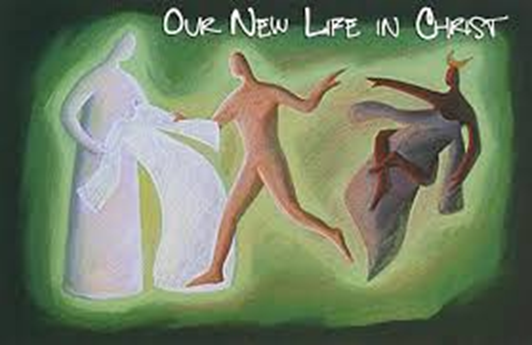
Luke 14:1,7-14 Parable on Humility
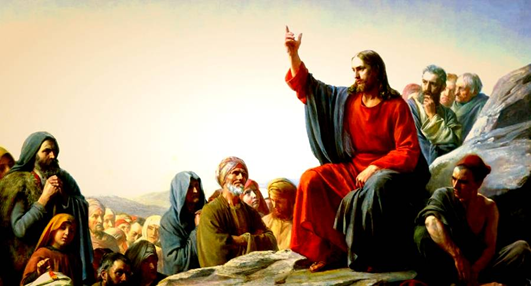
Context:
In today’s reading, Jesus is invited to a dinner party given by a prominent Pharisee. This is the third banquet with the Pharisees and scribes recorded in the Gospel of Luke.
Friends and important guests were often invited to a Sabbath meal after the Synagogue service or the Temple worship service. The meal usually took place at noon (the 6th hour Jewish time and the 12th hour Roman time). No work could be done on the day of the Sabbath rest, so the meal would have been prepared the day before, on Friday which was called "Preparation Day" for the Sabbath.
The reading says, “and the people there were observing him (Jesus) carefully.” This was likely because Jesus had caused controversy by healing on the Sabbath on a number of occasions, so the people were watching Him closely to see if He would heal again on the Sabbath.
If Luke hadn't designated this reading as a parable, it might be interpreted as Jesus directly chastising his host and the other guests on their conduct and lack of humility. The other hint that it is a parable is that Jesus uses a wedding in his story, not a dinner party. And the wedding he is referring to is between mankind and God. This "wedding" recalls the prophecy of Israel's promise of restoration to God's fellowship:
No more shall you be called forsaken, nor your land called desolate. For the LORD delights in you, and your land shall be espoused. For as a young man marries a virgin, your Builder shall marry you. And as a bridegroom rejoices in his bride so shall your God rejoice in you. – Isaiah 62:4-5

Luke 14:1,7-14 Parable on the Kingdom and Humility
On a sabbath Jesus went to dine at the home of one of the leading Pharisees, and the people there were observing him carefully.
He told a parable to those who had been invited, noticing how they were choosing the places of honor at the table.
"When you are invited by someone to a wedding banquet, do not recline at table in the place of honor. A more distinguished guest than you may have been invited by him, and the host who invited both of you may approach you and say, 'Give your place to this man,' and then you would proceed with embarrassmentto take the lowest place.
Rather, when you are invited, go and take the lowest place so that when the host comes to you he may say, 'My friend, move up to a higher position.' Then you will enjoy the esteem of your companions at the table.
For everyone who exalts himself will be humbled, but the one who humbles himself will be exalted."
Then he said to the host who invited him, "When you hold a lunch or a dinner, do not invite your friends or your brothers or your relatives or your wealthy neighbors, in case they may invite you back and you have repayment. Rather, when you hold a banquet, invite the poor, the crippled, the lame, the blind; blessed indeed will you be because of their inability to repay you. For you will be repaid at the resurrection of the righteous."
Exegesis (Study and Interpretation)
How might Jesus’ message to “take the least seat in the house” apply to us?
It can apply to everything we do – at work, on the road, at home. It’s a mindset, an attitude. It’s heavenly training.
What was the main difference between inviting honored guests and the poor and lame who had nothing?
ROI (return on investment). Inviting prominent people gets you something back – it’s good for your reputation and you likely get invited to future prominent events. As for the have-nots, there is no worldly return as they cannot pay you back with anything; but Jesus says God will pay us back many times over, in Heaven.
Why might the Pharisees believe that their destiny was secure in Heaven?
1) They judged themselves as "righteous" because of their strict adherence to the Law of Moses, and
2) As descendants of Abraham, they judged themselves as the heirs of God's covenant promises.
Jesus explained that the laws of Moses were not an end in themselves but a means to love of God and neighbor. Checking the boxes by following the rules misses the “heart” of all God’s laws. Secondly, Jesus taught that being descendants of Abraham did not guarantee anything. It’s our daily decisions of humility, kindness, and service to our fellow man that determines if we have the heart for Heaven.
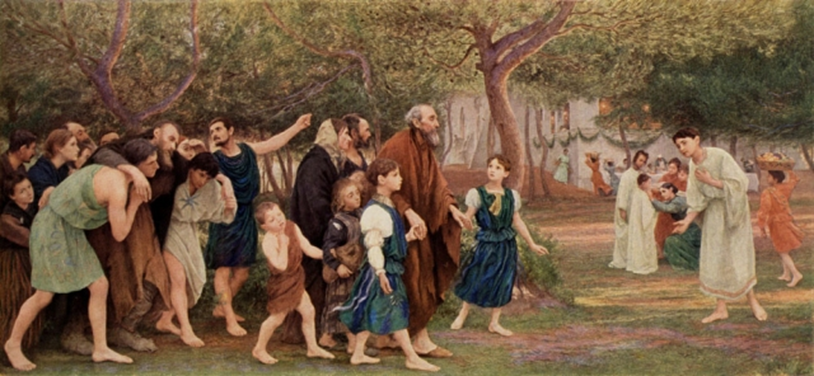
Inviting the poor and lame to dinner!
Genesis 3 – The Fall of Man
The “story of human” starts with our arrival at the end of chapter one after the creation of the universe, the earth, nature, and the animals; then in chapter two we receive our spiritual natures making us in the image and likeness of God; and then in chapter three is our “Fall” from grace. This grace will be returned to humans when Jesus comes.
When God placed Adam in Eden in the garden, He told him he could eat of all the trees in the garden except the Tree of Knowledge of Good and Evil. Was this tree evil?
No, the tree was not evil. God was teaching our first parents how to be His “stewards” (caretaker/manager) over the earth. Like with any “apprentice,” the first lesson is to listen. The Bible speaks of obedience, but that originally meant “to listen” and it implied doing after listening, like any good apprentice in a skill or trade. But this was no ordinary human trade, it was a Godly skill, meaning that listening and doing was to learn the ways of God. The foremost of God’s trade is love and self-giving. The forbidden tree represented a dangerous alternative, the same one that all free-will beings have the option of choosing: to NOT listen and go it alone. Alas, pride is not an easy test. Recall that a third of the angels failed that test.
The tree was not just a “Tree of Knowledge” as it is often mischaracterized. Note that it has “Good and Evil” attached to it, suggesting that whoever ate from this tree would gain the power to determine good and evil. This was a lie, but pride is gullible when hungry.
We often say Adam and Eve ate the forbidden apple. Is this accurate?
No, the Bible never mentions “apple”; only “fruit of the tree.”
Where did the idea of “apple” come from?
The tree’s association with the apple likely originated from the Latin word "malus," which can mean both "bad" and "apple." Later artistic depictions solidified the image of Adam and Eve with an apple in hand.
Other early traditions speculated that the tree might be a fig tree, since later in Genesis 3, Adam and Eve use fig leaves to cover their nakedness. In any event, we know the fig tree was present in the garden!
Genesis 3:1-8
Now the snake was the most cunning of all the wild animals that the LORD God had made. He asked the woman, “Did God really say, ‘You shall not eat from any of the trees in the garden’?”
The woman answered the snake: “We may eat of the fruit of the trees in the garden; it is only about the fruit of the tree in the middle of the garden that God said, ‘You shall not eat it or even touch it, or else you will die.’”
But the snake said to the woman: “You certainly will not die! God knows well that when you eat of it your eyes will be opened and you will be like gods, who know good and evil.”
The woman saw that the tree was good for food and pleasing to the eyes, and the tree was desirable for gaining wisdom. So she took some of its fruit and ate it; and she also gave some to her husband, who was with her, and he ate it.
Then the eyes of both of them were opened, and they knew that they were naked; so they sewed fig leaves together and made loincloths for themselves.
When they heard the sound of the LORD God walking about in the garden at the breezy time of the day, the man and his wife hid themselves from the LORD God among the trees of the garden.
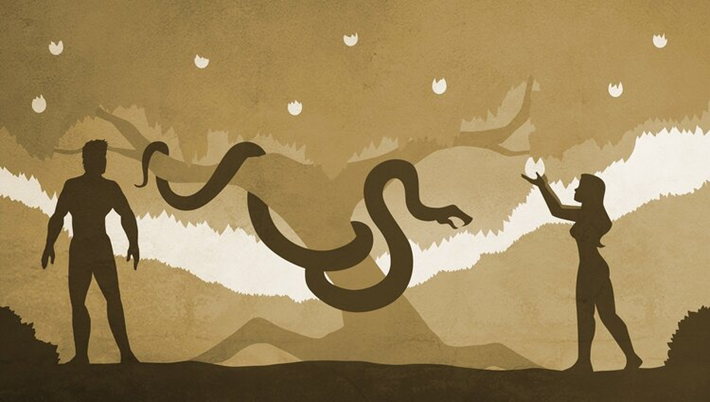
Exegesis of Gen 3:1-8
1 Now the serpent was more subtle than any other wild creature that the LORD God had made.
He said to the woman, “Did God really say, ‘You shall not eat from any of the trees in the garden’?”
The serpent is introduced as a creature distinct in its craftiness, suggesting intelligence and cunning. In ancient Near Eastern cultures, serpents not only symbolized wisdom but also chaos and danger. Therefore, the serpent's presence in the garden – a place of divine order – introduces a potential for disruption.
The phrase about the serpent – "that the LORD God had made” – emphasizes God's sovereignty over creation, including the serpent, which is identified with Satan in Rev 12:9. This connection suggests a deeper spiritual conflict beyond the immediate narrative.
The conversation started by the serpent seems casual. But he has already – subtly – introduced a lie. What is it?
First, notice the tone of mocking surprise in the serpent’s words – “Did God really say…” – as if the he could not believe that God would give such a command. Isn’t that how temptations often begin – with some mockery “deserving” a response? Moreover, Satan combines it with a lie. Satan knows very well that God did not say they could not eat from “any of the trees in the garden.” God only prohibited one Tree – the tree the serpent was in.
This was just a strategy to get Eve engaged in conversation. He lets Eve correct him – that was always part of the plan – because the goal was to get Eve feeling confident in talking. Have you ever been in a similar situation when suddenly you’re the one who knows more than the others around you? The ego kicks in and you get talking, which can distract you from what was going on in the first place. In this case, it was a way to distract Eve from focusing on whether or not she should be there in the first place.
Who remembers what Jesus said about Satan?
“When he lies, he speaks his native language, for he is a liar and the father of lies.” (Jn 8:41)
“Father of lies” means he is the first liar and, in fact, this was probably the first lie. Second, he is the best liar, not only because angels are smarter than humans, but he has been at it a lot longer. He is the Liar Exemplar, the archetype for human liars. If Jesus is the archetype of the perfect human, the devil is our archetype of the perfect fallen human.
Temptation
We’ve just gotten started and we already need to start dissecting temptation. The first reason is because of the way temptation works.
When we are tempted to do something we will later regret, is it usually one big temptation or a series of smaller ones that trap us in the end?
It is most often smaller ones that seem like no big deal and then comes the next, and the next, and before we know it we are in knee-deep.
Therefore, we have to start questioning where things are going right at the beginning and not get sidetracked because temptation is NEVER a shrinking violet; it is an aggressive peacock, showboat, and fast-acting drug.
True to form, in the passage above we are witnessing Eve’s first temptations that will lead her to the big one.
What are the temptations so far?
1) Notice how the serpent – the tempter – seems quite engaging and even reasonable. Isn’t that how it usually begins? Eve quickly engages and takes the bait. Be careful not to get into conversations with the wrong people. There is 99% chance it’s not going to turn out holy.
2) We all have “inner temptations” and “outer temptations”; and although we like to blame outer temptations, both are usually in play. When we engage an outer temptation, we usually have some inner desire that got us to that point. Temptation is crafty, subtle, scheming, unsuspecting, and acts like your best friend – until it’s too late. In this case, Eve was hanging out at the one tree that was prohibited. She was window-shopping at the wrong place. And the longer you remain where you shouldn’t, the worse your chances of getting away unscathed. Don’t put yourself in places where you know trouble can happen.
Some wonder if Eve knew the tree was prohibited since God gave the prohibition to Adam before Eve was on the scene. Did Eve know?
Eve knew.
The woman answered the snake: “We may eat of the fruit of the trees in the garden; it is only about the fruit of the tree in the middle of the garden that God said, ‘You shall not eat it or even touch it, or else you will die.’
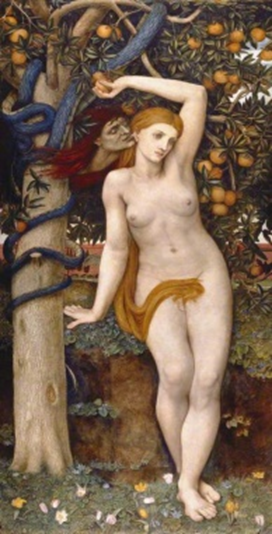
Next month: Adam gets into the act!
Closing Prayer
O Lord, do with me as You will.
Relieve me of the bondage of self, so that I may better do Thy will.
Take away my difficulties that victory over them may bear witness to those I would help.
May I do Thy will always!
Hail Mary
Hail Mary, full of grace, the Lord is with thee.
Blessed are thou among women,
and blessed is the fruit of thy womb, Jesus.
Holy Mary, Mother of God,
pray for us sinners,
now and at the hour of our death. Amen.


Comments